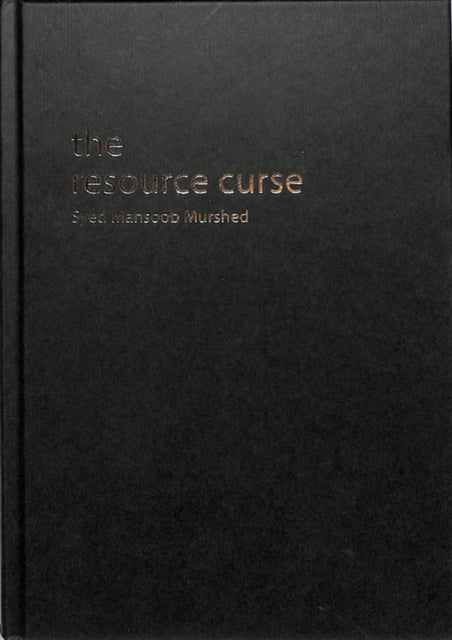Syed MansoobMurshed
Resource Curse
Resource Curse
YOU SAVE £4.08
- Condition: Brand new
- UK Delivery times: Usually arrives within 2 - 3 working days
- UK Shipping: Fee starts at £2.39. Subject to product weight & dimension
Bulk ordering. Want 15 or more copies? Get a personalised quote and bigger discounts. Learn more about bulk orders.
Couldn't load pickup availability
- More about Resource Curse
The resource curse, or paradox of plenty, states that countries with abundant natural resources, such as minerals and fuels, tend to have less economic growth than those with fewer resources. This idea explores the complexities of resource booms, export-led growth, deindustrialization, rent-seeking behavior, corruption, and the empirical evidence of resource dependence on growth. It also considers the links between resource rents and the risk of conflict and civil war.
Format: Hardback
Length: 168 pages
Publication date: 21 December 2020
Publisher: Agenda Publishing
The resource curse, also known as the paradox of plenty, is a well-established notion in development economics that suggests that countries with abundant natural resources, particularly minerals and fuels, tend to experience less economic growth compared to countries with fewer resources. In simpler terms, resources are often seen as an economic burden rather than a blessing. This brief primer aims to delve into the complexities of this concept and the ongoing debates surrounding it. Specifically, it examines the conditions under which the resource curse might manifest, if not universally. The discussion spans various aspects, including the nature of resource booms, the benefits and costs of export-led growth, the challenges of deindustrialization and manufacturing base erosion, rent-seeking behavior and corruption, and the empirical evidence regarding the effects of natural resource dependence on growth. Additionally, the book explores the connections between resource rents and the risk of conflict and civil war. Throughout the treatment, a wide range of illustrative examples from both developed and developing countries are used to provide insights and offer an authoritative introduction to this perplexing issue of economic growth.
The Resource Curse
The resource curse, also known as the paradox of plenty, refers to the long-standing belief in development economics that countries with abundant natural resources, particularly minerals and fuels, tend to perform less economically than countries with fewer resources. This notion suggests that resources can be a curse rather than a blessing for a country's development.
There are several reasons behind this paradoxical phenomenon. One of the primary factors is the so-called "resource curse hypothesis," which suggests that resource abundance can lead to a decline in economic growth due to various factors such as rent-seeking behavior, corruption, and political instability.
Resource abundance can also create economic distortions and imbalances, as countries with abundant resources may prioritize the extraction and export of these resources over other sectors of the economy, such as manufacturing and services. This can lead to a lack of diversification and vulnerability to external shocks, such as fluctuations in global demand for resources.
Furthermore, resource-rich countries may face challenges in managing their resources sustainably, leading to environmental degradation, social unrest, and economic instability. For example, countries with large oil reserves may experience oil spills, which can harm the environment and disrupt local communities.
Despite these challenges, there are also debates surrounding the resource curse. Some economists argue that resource abundance can be a catalyst for economic growth if it is managed properly. They suggest that resource-rich countries can use their resources to develop infrastructure, promote education, and invest in other sectors of the economy to create jobs and promote sustainable development.
Another argument is that the resource curse is more of a myth than a reality. Some economists argue that resource abundance can actually lead to economic development if it is managed effectively and used to promote inclusive growth. They suggest that resource-rich countries can use their resources to create jobs, improve infrastructure, and provide social services to their citizens, leading to increased prosperity and reduced poverty.
The empirical evidence on the effects of natural resource dependence on growth is mixed. Some studies suggest that resource-rich countries tend to experience slower economic growth compared to resource-poor countries. However, other studies argue that resource abundance can lead to faster economic growth if it is managed properly and used to promote inclusive growth.
In conclusion, the resource curse, or paradox of plenty, is a complex and multifaceted concept that has been debated for many years in development economics. While resource abundance can pose challenges for economic growth, it is not necessarily a universal phenomenon. Effective management of resources, diversification of the economy, and promotion of inclusive growth can help mitigate the negative effects of resource dependence and promote sustainable development.
Weight: 328g
Dimension: 155 x 217 x 14 (mm)
ISBN-13: 9781911116486
This item can be found in:
UK and International shipping information
UK and International shipping information
UK Delivery and returns information:
- Delivery within 2 - 3 days when ordering in the UK.
- Shipping fee for UK customers from £2.39. Fully tracked shipping service available.
- Returns policy: Return within 30 days of receipt for full refund.
International deliveries:
Shulph Ink now ships to Australia, Belgium, Canada, France, Germany, Ireland, Italy, India, Luxembourg Saudi Arabia, Singapore, Spain, Netherlands, New Zealand, United Arab Emirates, United States of America.
- Delivery times: within 5 - 10 days for international orders.
- Shipping fee: charges vary for overseas orders. Only tracked services are available for most international orders. Some countries have untracked shipping options.
- Customs charges: If ordering to addresses outside the United Kingdom, you may or may not incur additional customs and duties fees during local delivery.


